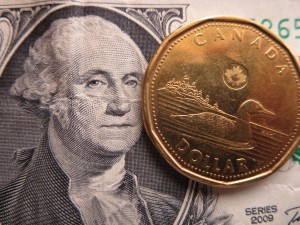Lower energy prices weaken Canadian dollar
When it comes to exchange rates, there’s the big economic picture and the personal slant, as in “where will my dollar go farther?”
Right now it’s more expensive for Canadians to buy U.S. goods, or travel there.
But Canada is back “on sale” for American visitors. The Canadian dollar hit a 5-year low this past week, trading at 87.80.
Obviously, this number fluctuates. When this post was written on Friday, the Canadian dollar was back to 89 cents. But that’s still 10% off parity, in favor of the U.S. consumer.
Why the drop? Well, that’s what happens when a national economy relies so heavily on resource extraction. Or so say many experts. As reported by CBC:
In terms of currencies, “oil” and “Canada” have become synonymous in recent years, so the loonie is paying the price. “The weakness in oil prices is spilling over in a nasty fashion in Canada,” said Mark Chandler at RBC Dominion Securities.
“The more oil prices fall, the more [the loonie will drop],” Jeremy Stretch at CIBC added.
This post starts with the exchange rate in terms of cross-border travel. But when it comes to money and energy, the story gets very broad indeed. There’s a lot going on in terms of oil supply and price. But the energy boom in North America is inseparable from a larger global market, with ramifications for all.
The Economist framed the issue of falling oil prices as a question “Is that good or bad news for the world economy?” And answered thusly:
This time, though, matters are less clear cut. The big economic question is whether lower prices reflect weak demand or have been caused by a surge in the supply of crude. If weak demand is the culprit, that is worrying: it suggests the oil price is a symptom of weakening growth. If the source of weakness is financial (debt overhangs and so on), then cheaper oil may not boost growth all that much: consumers may simply use the gains to pay down their debts. Indeed, in some countries, cheaper oil may even make matters worse by increasing the risk of deflation. On the other hand, if plentiful supply is driving prices down, that is potentially better news: cheaper oil should eventually boost spending in the world’s biggest economies.
The CBC’s Don Pittis expounds on similar themes from the Canadian perspective, with observations on why high cost extraction (like Canada’s oil sands, or fracking) sometimes continues even when crude oil from the middle east costs less. And while oil looms large in this story, there are other sectors to consider too:
…it is not all bad for the Canadian economy as a whole. Lower oil prices will result in what we might call reverse Dutch disease.
As described by NDP leader Tom Mulcair and Bank of Canada governor Stephen Poloz, Dutch disease means the loonie gets pushed up by oil exports, pricing Canada’s manufactured goods out of world markets.
Pittis senses a sea change, though. He thinks oil is the past and the world will (must?) transition to alternative energies. A change energy-dependent economies would do well to anticipate.









